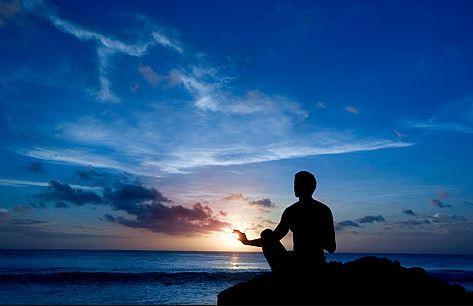
Solitude (ekanta) is a great source of joy for the spiritual aspirant. Solitude refers to the enjoyment of a simple, quiet, contemplative environment where one can just be happy with oneself. It requires not constantly engaging the mind in activity but just taking the time to smell the “roses.” It is just cherishing one’s own company. Solitude should not be mistaken for loneliness. Solitude is different from loneliness. Paul Tillich (1886-1965), a German-American Christian theologian, has very beautifully summarized this distinction in his quote, “Loneliness expresses the pain of being alone and solitude expresses the glory of being alone.” Similarly, May Sarton (pen name of Eleanore Marie Sarton, 1912-1995), an American poet, has expressed the same sentiment by saying, “Loneliness is the poverty of self; solitude is the richness of self.”
However, getting solitude is becoming difficult in modern-day life. Sometimes it is inevitable for us to find solitude because of the demands of work while at other times when we do find alone time, we cannot handle it. We try to become busy by listening to music, watching television, spending time on our smartphones, calling friends, surfing through the Internet, and doing other things that apparently keep us busy. Not knowing what to do with alone time or boredom is becoming a major stressor in present times. We have more free time than our ancestors due to the advancements in automation and the benefits of industrialization. But we have not learned how to handle this free time which is becoming a major threat to our goal of obtaining peace and contentment.
Silence is very important in solitude. William Penn (1644-1718), the founder of the State of Pennsylvania, wrote, “True silence is the rest of the mind, and is to the spirit what sleep is to the body, nourishment and refreshment.” Silence indeed offers a lot of benefits. We live in a world where silence is becoming difficult to find. We are constantly surrounded by noise. Noise pollution has become one of the sources of stress in modern-day life. According to the World Health Organization (WHO), noise pollution has a myriad of harmful health effects such as a greater risk of heart disease, insomnia and other sleep disorders, cognitive damage, especially among children, tinnitus, simple annoyance, and other stress-related health problems. Sometimes noise is inevitable, at other times we are responsible for creating noise around us. It has been shown that silence relieves stress and has been shown in some animal studies to even help in the regeneration of brain cells. Bassett and colleagues in a journal article published in 2018 in Palliative Medicine even talk about the role of silence as a psychotherapeutic approach. However, it is very difficult to practice silence. I am reminded of a story of four monks who were practicing silence. They remained silent for the entire day when at the start of the evening they lit a candle. Soon the candle started flickering. The first monk said, “Oh God, the candle is out.” The second monk replied, “You are not supposed to talk.” The third monk retorted, ‘Why on earth did you two break the silence?” The fourth monk calmly said, “Great, I am the only one who is silent.” The moral of the story is that each one of the monks broke their silence but for a different reason. The first one was distracted. The second one was caught judging others and was more concerned about others breaking the rules rather than focusing on himself. The third one was anger which came in the way of his goal of silence. Finally, the fourth monk was full of pride and wanted to prove that he was superior to others. So, we see that distraction, judgment, anger, and pride are all barriers to attaining solitude. We must try to get over these barriers and try to practice silent solitude every day for some time.
Solitude can be used to do meditation. Introspective meditations (manan dhyana) or using thoughts to analyze one’s own thoughts are an excellent start to enjoying one’s solitude. However, true meditation is beyond the realm of thoughts and feelings. A simple technique to perform meditation is by watching one’s breathing and just merging in that awareness. Another method for meditation can be by chanting a mantra, slowly making it an inner chant, and then merging it with that mantra. An easy mantra to recite is the sound of “Aum.” Another procedure for meditation is to focus on the five elements of earth, water, air, fire, and sky and focus on inner balance both outside and inside. Another process for meditation is to meditate on the senses of touch, taste, smell, hearing, sight, and kinesthetic sense without engaging in them. Another system of meditation is Kundalini yoga in which awareness is focused on different chakras that correspond to various endocrine glands.
Another way of utilizing solitude is by engaging in creative activities. There are lots of ways of expressing one’s creativity. Some people like to draw, others like to sketch, some people like me engage in coloring or writing and the list goes on. When nature creates something, it always has newness in it. The leaves on a tree may look similar but when we closely examine them, they are all different in their finer attributes. Likewise, all human beings look similar but no two human beings are the same. So, when one creates something, one should try to create it in its unique way, and in such a creation, one often finds one close to the creation. If one is cooking a dish one should try to do it with newness every time the same ingredients are mixed. Mechanization and reproduction in an industrialized world are robbing us of our creativity and thus links with creation. One should find some creative activity that is not done for monetary benefit but solely for the purpose of deriving peace and contentment.
Solitude also entails not being perturbed by the absence of social interaction or company. One should not detest company but must be content both in the absence or the presence of people around oneself. It requires a balance between being an introvert and an extrovert. One should be happy just with oneself. Sometimes people are bothered by getting old because it provides more solitude and reduces interaction with others. Old age should be treated as bliss. Here are some ways you can increase the bliss of solitude in your life by introspective meditation (manan dhyana) or reflection on the following five points:
In the past 24 hours, did I have any time for solitude?
What did I do in this alone time?
In the past 24 hours, did I crave company or interaction?
Can I devote more time regularly in solitude?
What can I do to practice silence, meditation, or creative activity in the future?
The author is a Professor and Chair of the Department of Social and Behavioral Health at the University of Nevada, Las Vegas, USA. He is an avid practitioner of Kundalini Yoga.















